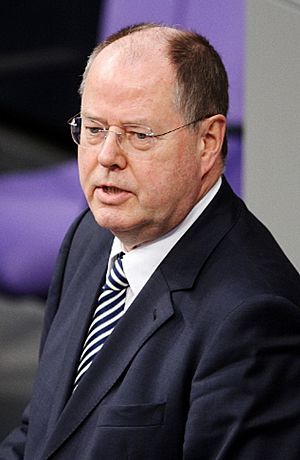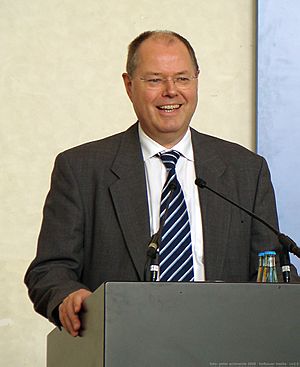Peer Steinbrück facts for kids
Quick facts for kids
Peer Steinbrück
|
|||||||||||||||||||||||
|---|---|---|---|---|---|---|---|---|---|---|---|---|---|---|---|---|---|---|---|---|---|---|---|

Steinbrück in 2013
|
|||||||||||||||||||||||
| Minister of Finance | |||||||||||||||||||||||
| In office 22 November 2005 – 28 October 2009 |
|||||||||||||||||||||||
| Chancellor | Angela Merkel | ||||||||||||||||||||||
| Preceded by | Hans Eichel | ||||||||||||||||||||||
| Succeeded by | Wolfgang Schäuble | ||||||||||||||||||||||
| Minister-President of North Rhine-Westphalia | |||||||||||||||||||||||
| In office 6 November 2002 – 22 June 2005 |
|||||||||||||||||||||||
| Deputy | Michael Vesper | ||||||||||||||||||||||
| Preceded by | Wolfgang Clement | ||||||||||||||||||||||
| Succeeded by | Jürgen Rüttgers | ||||||||||||||||||||||
| Deputy Leader of the Social Democratic Party | |||||||||||||||||||||||
| In office 15 November 2005 – 29 September 2009 |
|||||||||||||||||||||||
| Leader |
|
||||||||||||||||||||||
| Preceded by | Wolfgang Thierse | ||||||||||||||||||||||
| Succeeded by | Manuela Schwesig | ||||||||||||||||||||||
| Minister of Finance of North Rhine-Westphalia | |||||||||||||||||||||||
| In office 22 February 2000 – 12 November 2002 |
|||||||||||||||||||||||
| Minister-President | Wolfgang Clement | ||||||||||||||||||||||
| Preceded by | Heinz Schleußer | ||||||||||||||||||||||
| Succeeded by | Jochen Dieckmann | ||||||||||||||||||||||
| Minister of Economy and medium-sized Businesses, Technology and Transportation of North Rhine-Westphalia | |||||||||||||||||||||||
| In office 28 October 1998 – 22 February 2000 |
|||||||||||||||||||||||
| Minister-President | Wolfgang Clement | ||||||||||||||||||||||
| Preceded by | Bodo Hombach | ||||||||||||||||||||||
| Succeeded by | Ernst Schwanhold | ||||||||||||||||||||||
| Minister of Economy, Technology and Transportation of Schleswig-Holstein | |||||||||||||||||||||||
| In office 19 May 1993 – 28 October 1998 |
|||||||||||||||||||||||
| Minister-President | Heide Simonis | ||||||||||||||||||||||
| Preceded by | Uwe Thomas | ||||||||||||||||||||||
| Succeeded by | Horst Günter Bülck | ||||||||||||||||||||||
|
|||||||||||||||||||||||
| Personal details | |||||||||||||||||||||||
| Born | 10 January 1947 Hamburg, Allied-occupied Germany (now Germany) |
||||||||||||||||||||||
| Political party | Social Democratic | ||||||||||||||||||||||
| Alma mater | University of Kiel | ||||||||||||||||||||||
| Occupation |
|
||||||||||||||||||||||
| Signature |  |
||||||||||||||||||||||
| Military service | |||||||||||||||||||||||
| Allegiance | Germany | ||||||||||||||||||||||
| Branch/service | Bundeswehr | ||||||||||||||||||||||
| Years of service | 1968–1970 | ||||||||||||||||||||||
| Rank | Leutnant | ||||||||||||||||||||||
| Unit | |||||||||||||||||||||||
Peer Steinbrück (born 10 January 1947) is a German politician. He was a very important figure in the Social Democratic Party (SPD). He ran to become the Chancellor in the 2013 election.
Before that, Steinbrück was the Minister-President (like a state governor) of North Rhine-Westphalia from 2002 to 2005. He also served as the Federal Minister of Finance for Germany from 2005 to 2009. This was during the first government led by Chancellor Angela Merkel. He was also a member of the Bundestag (Germany's parliament) from 2009 to 2016.
Contents
Early Life and Education
Peer Steinbrück was born in Hamburg, Germany, on 10 January 1947. His father, Ernst Steinbrück, was an architect.
After serving in the military, Steinbrück went to the University of Kiel. He studied economics there and finished his studies in 1974.
Starting His Career
After college, Steinbrück worked in different German government offices. From 1978 to 1981, he worked in the office of German Chancellor Helmut Schmidt.
In the 1980s, he became the chief of staff for Johannes Rau. Rau was the Minister-President of North Rhine-Westphalia at that time.
In 1993, Steinbrück became a state minister in Schleswig-Holstein. He was in charge of economic affairs and infrastructure. Later, he returned to North Rhine-Westphalia. There, he became the Minister of Economic Affairs in 1998 and the Finance Minister in 2000.
Leading North Rhine-Westphalia
From 2002 to 2005, Peer Steinbrück was the Minister-President of North Rhine-Westphalia. He led a government that included his SPD party and the Green Party.
In 2003, Steinbrück worked with another politician, Roland Koch. They created a plan to reduce tax breaks and government help (subsidies). This included subsidies for coal mining. Even though coal mines were important in North Rhine-Westphalia, they agreed to cut these subsidies. Steinbrück also supported a plan called "Agenda 2010" to modernize Germany.
In the state election in May 2005, Steinbrück's party lost. This loss had a big effect on national politics. The Chancellor at the time, Gerhard Schröder, decided to call an early national election. This led to Angela Merkel becoming Chancellor for the first time.
Germany's Finance Minister
After the 2005 national election, the SPD and CDU formed a "Grand Coalition." This meant the two biggest parties worked together. Peer Steinbrück became Germany's Finance Minister in November 2005.
His job was to reduce Germany's budget deficit (when the government spends more than it earns). He also worked to lower public debt (money the government owes). He introduced changes to the tax system. For example, a new tax was put on income from investments to prevent tax evasion.
Steinbrück played a key role during the big 2008 financial crisis. He helped guide Germany's financial and economic efforts to deal with the crisis. From 2005, he was also a deputy leader of the SPD party.
Running for Chancellor
In 2012, the SPD party chose Peer Steinbrück as their candidate for Chancellor. He would run against Angela Merkel in the 2013 federal election.
During his campaign, Steinbrück promised to introduce rent controls. He also wanted to raise taxes to fund education and infrastructure. He visited Greece to discuss the euro area crisis. He believed that the euro currency was very important for European unity.
Steinbrück also talked about foreign policy. He said he would reduce Germany's arms exports to countries like Saudi Arabia.
His campaign faced some challenges. There was discussion about money he received for giving speeches to banks. Despite support from former Chancellors, his campaign did not gain enough momentum. In the election on 22 September 2013, Merkel's party won. Steinbrück's Social Democrats received 25.7 percent of the votes.
After the Election
After the 2013 election, Steinbrück was part of the SPD team. They talked with Merkel's party about forming another coalition government.
As a member of parliament, Steinbrück served on the Committee on Foreign Affairs. He also chaired the German-American Parliamentary Friendship Group until 2016.
In September 2015, Steinbrück announced he would not run in the 2017 federal elections. He left his seat in the Bundestag in September 2016.
What He Believed In
Peer Steinbrück was known for his strong opinions on economic matters.
Economic Ideas
In 2007, he suggested creating international rules for the "hedge fund" industry. He thought some hedge funds were not acting properly.
In 2008, after the financial crisis, Steinbrück said that the United States might lose its power as a financial leader. He also questioned if large government spending plans (fiscal stimulus) were effective. He worried about the increase in public debt.
He often criticized the United Kingdom. He felt they were not doing enough to reform global financial markets. In 2009, he supported limiting bank executives' bonuses. He also called for a global tax on financial transactions. He wanted to stop what he called "binge-drinking" on markets.
In 2012, Steinbrück proposed a plan for new financial rules. This included making banks help fund a large rescue fund. He also suggested separating investment banking from regular banking.
European Cooperation
Steinbrück believed Germany should keep its influence in the IMF (International Monetary Fund). This is an organization that helps countries with their money problems. He argued that Germany, as a large economy, needed its own voice. He did not think Eurozone countries should have only one seat on the IMF board.
Other Activities
Peer Steinbrück has been involved in several other organizations:
- He was a member of the supervisory board for the football club Borussia Dortmund.
- He was an advisor to the board of ING-DiBa, a bank.
- He was a member of the supervisory board for ThyssenKrupp, a large steel company.
- He is the chairman of the Federal Chancellor Helmut Schmidt Foundation.
- He is also a member of the board of trustees for the ZEIT-Stiftung.
Recognition
- In 2011, the University of Düsseldorf gave him an honorary doctorate degree.
- In 2011, he was a visiting professor at the University of Duisburg-Essen.
Personal Life
Peer Steinbrück is married to Gertrud Steinbrück. She used to be a biology and politics teacher. They have three children together.
See also
 In Spanish: Peer Steinbrück para niños
In Spanish: Peer Steinbrück para niños
 | Tommie Smith |
 | Simone Manuel |
 | Shani Davis |
 | Simone Biles |
 | Alice Coachman |


